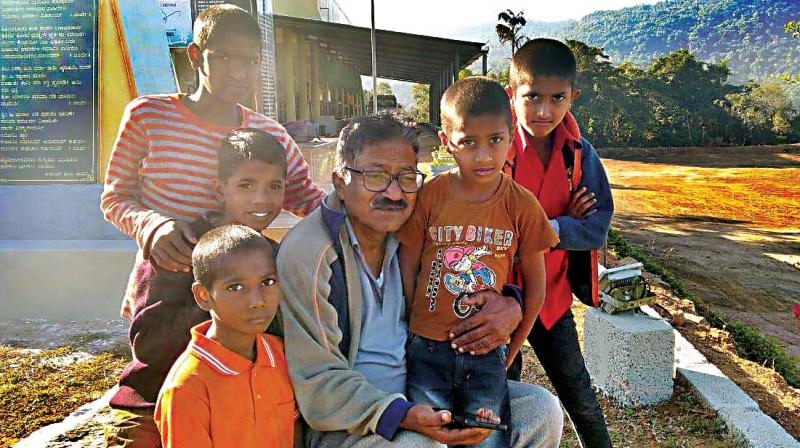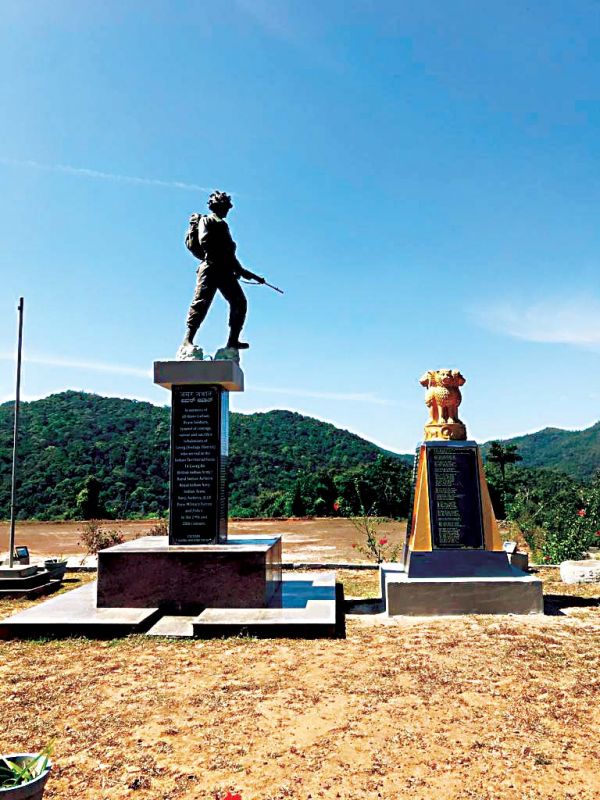Urban Legend: O Captain! my Captain! ode to India's war heroes
It's not what you expect to see in the heart of the Western Ghats around the spot where the river Cauvery originates.

Nestled in the Western Ghats, where the river Cauvery originates, is a little-known memorial. On it are inscribed the names of 49 soldiers from a village nearby, who lost their lives in World Wars 1 and 2. It's a heroic and elaborate effort by Mottana C. Ravi Kumar, an advocate and the son of an army man. Over the years, officers like Kargil war veteran Major Rakesh Sharma have visited the memorial, much to Kumar's pride, writes Aksheev Thakur
It’s not what you expect to see in the heart of the Western Ghats around the spot where the river Cauvery originates. But venture deep into the green canopy of the ghats and you come across a war memorial inscribed with the names of 49 soldiers from a village here, who lost their lives in World Wars I and II.

Cherangala village in Kodagu has an advocate, Mottana C Ravi Kumar, the son of an army man, to thank for the memorial that pays tribute to its patriotic sons killed in the two wars.
It’s an elaborate memorial, the statute having come from Mohali. It nearly got a T-55 tank too, but the bridge in the village was not strong enough to carry it, forcing that plan to be abandoned . Next to the statue stands an Ashok Stambh with each side inscribed with Kavi Pradeep’s famous “Aye Mere Watan Ke Logon” Iqbal’s “Sare Jahan se Accha,” Rabindranath Tagore’s “Where the Mind is Without Fear” and Bankim Chandra Chattopadhyay’s “Vande Mataram. “
The songs and the memorial are meant to inspire the young of the village , the advocate tells you. “Soldiers serve in inhospitable conditions and this is my little ode to them,” he says.
Distinguished officers of the the country’s armed forces like Field Marshal K M Cariappa’s son, Air Marshal (retd) KC Cariappa, Lt. Gen. (retd.), G S Nanda, and Kargil war veteran, Major Rakesh Sharma have visited the memorial over the years, much to the pride of the villagers, who continue to honour the memory of the men they sent off to war.
The army man that he was, Mr Ravi Kumar’s father wanted him to join the armed forces too, but he insisted on becoming a doctor. “Ultimately, I did not become either a doctor or a soldier, but an advocate and moved to Bengaluru to practice,” he smiles.
But he did flirt with the idea of joining the army, spending some time at the Dholpur Military School near Agra as a young man. “Father joined the army in 1941. When I joined the military school, the 1962 Indo-China war erupted. The principal often gave five and six-year-old children news of their fathers achieving martyrdom on the battlefield and I saw them crying. The scene was repeated in the 1965 war and this drew me emotionally close to the armed forces,” he recalls.
But the idea of the memorial in the village was born quite by chance. Being an advocate, he once filed a writ petition in court on the lack of road connectivity to his village and the resulting disadvantage this placed its families in when it came to getting brides for their sons as parents were reluctant to send their daughters away to such a remote spot in the ghats. “ Children had to travel five miles to go to school. So when I became an advocate I filed a writ petition in the high court and it was passed by Justice Gopal Gowda,” he adds .
During one of their meetings, Justice Gowda pointed out to him that he had not invited him to the village after the road was built to connect it to the rest of the state. “It was then that the idea of the war memorial came up as I could not have invited him for just the road,” he says. And he went on to build it at the spot where it still stands in memory of the village’s bravehearts.
A strong believer in the words of Swami Vivekananda that, “They only live who live for others, rest are more dead than alive, “ the advocate has fought several cases of defence personnel too over the years.
But he has not stopped there. Unlike many in Kodagu, who run homestays, Mr Ravi Kumar runs an orphanage as he feels someone has to take care of children with no one to turn to.
“There over 25 million orphans in India according to the United Nations and of them 10 lakh sleep on the streets of Kolkata, Mumbai and Delhi. We have not even done an independent census of orphans although countries like Pakistan and Sri Lanka have. But if we take the statistics of the UN into account, they form 2 per cent of the population and are not receiving any attention. The SCs, STs and OBCs have reservation, what about the orphans, who don’t know what their religion or caste is?” he asks pertinently.
Mr Ravi Kumar takes care of the children not only till they turn 18, but till they make their own way in life. “At least they can then go on to become soldiers in the Indian Army, if not officers,” he concludes.

